Subscriptions
Menu
Advertisements
Cannery meeting gets people thinking
2/25/2009 |
By Patsy Nicosia |

Peter Pehrson’s plans for a Schoharie County Co-op Cannery drew a standing-room-only crowd to an outreach session Saturday at Cobleskill’s Cooperative Extension.
The cannery would be “scaleable” Mr. Pehrson told a crowd of about 80; the backyard gardener with too many tomatoes and the commercial grower with a tractor-trailer load of carrots would be both be welcome and able to take advantage of a shared kitchen on one side or the industrial assembly line on the other.
Mr. Pehrson puts the cost of getting the cannery up and running at a $385,000 over three years.
Seasonally, he estimates it would employ as many as 40 people, though far fewer than that would have year-round jobs.
It would cost 40-50 cents a quart to have something canned—depending on whether it was in glass jars or tin containers—and though farmers would be able to take their finished product home for their own use or resale, the cannery would also include a retail store.
It all sounded good to Saturday’s crowd, but the biggest question is this:
In today’s economy, does the project have a chance?
Julie Pacatte Rohan, Schoharie County’s Empire Zone coordinator, believes the answer is yes—if Mr. Pehrson can find the right space, with access to municipal sewer and water and natural gas, and hopefully, because of the tax benefits it would gain, within the Empire Zone.
“If anyone can do it, Peter can,” Ms. Rohan said. “From my perspective, the real challenge is space.”
Mr. Pehrson had originally planned to use a turnkey “cannery in a box” manufactured by Embarcadero Home Canning, a California company. Embarcadero, however, has gone out of business, Ms. Rohan said.
“There’s money out there for projects that create jobs and are making capital investments. But I really can’t think of a space that meets his needs,” she added.
Earl VanWormer, chairman of the Board of Supervisors as well as a lifelong backyard farmer, said he’s impressed that Mr. Pehrson wants to start the cannery here.
“I’d much rather have a few businesses this size,” he said “When Interknitting went out, we all saw the impact it had. I’m fascinated by this idea...I’m confident with the right resources, he’ll do a good job.”
Already, Mr. Pehrson has been successful in writing a small grant from the New York Sustainable Agriculture Working Group and NYSAWG Executive Director Judy Einach was one of those talking the project up.
Like Ms. Rohan, she said the cannery seems geared toward the kind of grants that are available now, especially with its emphasis on making fresh food available to more people.
Mr. Pehrson said Saturday he’s looking at the CHX site across from the Cobleskill-Richmondville High School.
When someone in the crowd suggested the old Guilford—Interknitting site—the answer was “there’s a project in progress there,” but county officials have already said it’s too early to be more specific about that.
Saturday’s session stretched to nearly three hours as questions covered everything from Ag & Markets inspections to labels to marketing to whether there will be a place for canning meats.
The answer to that last question was no.
Though Mr. Pehrson had initially hoped to be able to can meats, the inspection process and equipment required are so different—and expensive—that that’s not feasible.
Mr. Pehrson said he hopes to have something in place in enough time to catch the tail end of this year’s apple season.
Farther down the road, he said, he’d like to see the project include gardens and a place for farm animals.
“I’m trying to connect people to their food,” he said. “We need to know where our eggs come from. We need to know where our milk comes from—and it’s now aisle five.”
Mr. Pehrson said he plans additional listening sessions on the cannery as his ideas firm up.
The cannery is online at www.schohariecannery.org.
Mr. Pehrson can also be reached by cell phone at (518) 702-4061.









